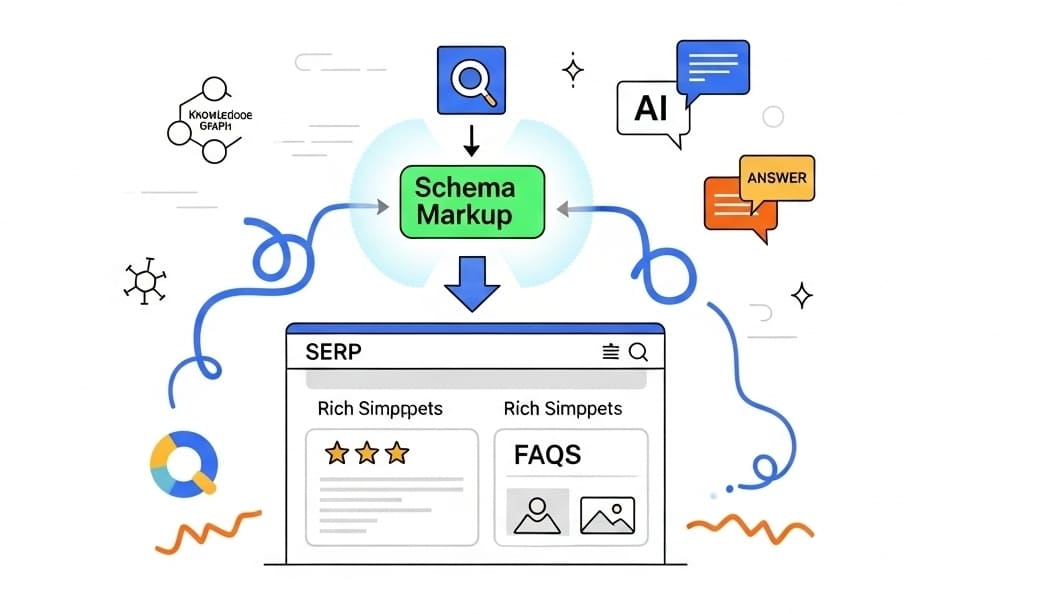Table of Contents
Schema markup (structured data) provides essential semantic context for Answer Engine Optimization (AEO). It translates webpage content into machine-readable data, allowing search engines and AI-driven platforms like Google’s SGE to deliver accurate and relevant answers directly to user queries.
Within this landscape, schema markup (structured data) from schema.org provides essential semantic signals to search engines. Schema converts human-readable text into structured, machine-readable data, allowing search engines to identify context, relevance, and entity salience accurately. As a result, your content naturally features in rich snippets, Google’s Knowledge Graph, and voice assistant responses.
In this article, you discover how schema boosts AEO, positioning your content as the authoritative choice for user queries.
What is Schema Markup (Structured Data)?
Schema markup is structured data code in JSON-LD format added to your website HTML. It uses standardized vocabulary from Schema.org to define specific information like product names, FAQs, reviews, and recipes for search engines.
On a recipe page, schema defines ingredients, cooking time, and calorie count. Search engines like Google or Bing use this information to display enhanced search listings called “rich results,” including star ratings, event details, or knowledge panels.
Schema markup eliminates ambiguity and makes your content easier to understand, strengthening your Answer Engine Optimization (AEO).

How Schema Markup Boosts Answer Engine Optimization (AEO)
Search engines now provide direct answers instead of links alone. Schema markup helps search engines understand your content, making your pages trusted answers.
Wondering how schema markup boosts Answer Engine Optimization (AEO)? Here are the main benefits:
Helping Search Engines Understand Content (Entities & Context)
Search engines rely on understanding entities and their relationships rather than matching keywords alone. Schema markup explicitly defines and connects these entities within your content. For example, schema can indicate that a page references a LocalBusiness named Joes Pizza in Thousand Oaks, CA, or identify Dr. Smith as a Dentist associated with XYZ Clinic.
Schema connects your content to Google’s Knowledge Graph, Google’s structured database of entities used to answer user queries. Using structured data properties such as sameAs, you link your content’s entities to authoritative external references like Wikipedia or Wikidata. Doing so disambiguates content for example, distinguishing “Paris,” the city in France, from Paris Hilton or Paris, Texas.
This precision directly supports Answer Engine Optimization (AEO). Accurate entity definition enhances your presence in Google’s knowledge panels, helping ensure the correct business details, logos, and associated individuals appear. Organization schema including founders, locations, and logos makes your brand details accurate and consistent across Google’s features.
Schema improves content credibility and aligns your content with Google’s E-E-A-T guidelines (Experience, Expertise, Authoritativeness, Trustworthiness). Defining authorship credentials, structured reviews, or official profiles signals content reliability. Schema can highlight verified details such as an author’s professional expertise or medical claims linked explicitly to trusted MedicalEntity references.
Enabling Rich Results and Featured Snippets
Schema markup activates rich results like FAQs, star ratings, images, and how-to steps. These elements increase visibility and improve user engagement on SERPs. Around 72.6% of Google’s first-page results use schema. Yet, only 30% of websites overall have implemented it. Schema implementation provides a competitive advantage.
For example, FAQPage schema turns Q&A content into expandable snippets on SERPs. FAQ snippets average an 87% click-through rate (CTR). In general, rich snippets attract around 58% of clicks compared to 41% for regular results. Nestlé found schema-enhanced pages increased CTR by 82%. These findings highlight schema’s measurable impact on user engagement and Answer Engine Optimization (AEO).
Schema also enhances featured snippet optimization. Well-structured content using headings, lists, and tables helps Google extract precise answers. Google specifically recommends schema for FAQs and How-To content. HowTo schema identifies individual tutorial steps, allowing Google to display instructional carousels. Review and Rating schema highlights product quality and pricing, answering user questions directly.
Supporting Voice Search and AI Answers
Voice assistants (Google Assistant, Siri, Alexa) deliver a single spoken answer to user queries. To become that selected response, your content must be concise and structured. Schema markup helps voice algorithms easily identify essential information.
For instance, Speakable schema (for news publishers) identifies sections ideal for voice devices. Schemas like FAQPage or HowTo structured data help voice assistants find exact user answers.
Local searches offer another example. Queries like “Find a pizza place in Thousand Oaks open now” cause voice assistants to check Google’s local listings. Adding LocalBusiness schema with opening hours, phone numbers, and addresses improves chances that voice assistants select your business. Schema markup provides exact data on business status and contact details, supporting your Google Business Profile.
Answer Engine Optimization (AEO) for voice search requires short, snippet-friendly answers. Sentences of 40-60 words help voice systems easily present content. Schema highlights these segments, boosting chances your content becomes the spoken answer.
Beyond voice, schema improves visibility in AI-generated results. Google’s Search Generative Experience (SGE) and chatbots (Bing Chat, ChatGPT plugins) use structured data to generate responses. Generative Engine Optimization (GEO) optimizes content for AI use. Schema markup provides essential context, enabling platforms to reference your content confidently.
Builds Authority and Credibility
Schema markup demonstrates authority and reliability to search engines. It structures critical details like author credentials, verified reviews, and publication dates. This structured data enables Google to confirm content authenticity.
For example, Author schema connects blog articles to professional author profiles. On medical websites, tagging authors as licensed medical experts increases content trustworthiness. Review schema prominently highlights real customer ratings within search results. Users instantly view genuine feedback, enhancing brand credibility.
Organization schema displays official business information such as logos, founding dates, and social profiles. Accurate brand information helps Google show correct Knowledge Panels.
Consistent use of schema markup establishes your website’s credibility. Search engines recognize your site as trustworthy. This improves visibility in AI-generated answers and featured snippets.

Common Schema Markup Types for AEO
Over 800 schema types exist on Schema.org. Specific schemas offer maximum value for Answer Engine Optimization (AEO). The following table outlines essential schemas optimized for direct, accurate search answers:
| Schema Type | How it Supports Answer Engine Optimization (AEO) |
| FAQPage | Shows common questions with exact answers. Enables Google FAQ results, increasing clicks. |
| HowTo | Provides numbered task steps. Google creates instructional snippets, answering “how-to” queries. |
| LocalBusiness | Structures business details (name, address, hours). Assists maps and voice assistants in answering local queries accurately. |
| Article | Identifies articles or blogs with author, headline, publication date. Allows rich features in AI-driven results. |
| Product | Defines product details (price, availability, reviews). Enables immediate answers for product queries in e-commerce snippets. |
| Speakable | Tags sections suitable for voice assistants. Assists devices in selecting ideal spoken content. |
| WebPage | Identifies the primary topic of a webpage. Improves Google’s topic understanding, increasing snippet opportunities. |
| QAPage | Structures exact Q&A sections. Enables search engines to provide direct answers clearly within results. |
| mainEntityOfPage | Defines the central topic or subject explicitly. Enhances accurate topic identification for relevant search answers. |
Schema markup selection must match your site’s content. Medical websites use MedicalCondition schema to detail illnesses, symptoms, or treatments, achieving better health-related visibility. Legal websites adopt QAPage schema to answer common legal questions directly and precisely.
Align schema markup exactly with your users’ questions and website content, maximizing your chances to appear as the direct answer in searches.
FAQPage Schema
FAQPage schema structures common questions and answers directly in search results. This enhances visibility, increases user interaction, and boosts Answer Engine Optimization (AEO). Users receive instant answers, driving higher clicks and trust.
<script type="application/ld+json">
{
"@context": "https://schema.org",
"@type": "FAQPage",
"mainEntity": [{
"@type": "Question",
"name": "How quickly do refunds process?",
"acceptedAnswer": {
"@type": "Answer",
"text": "Refunds usually process within 5-7 business days."
}
}, {
"@type": "Question",
"name": "Do you offer free shipping?",
"acceptedAnswer": {
"@type": "Answer",
"text": "Yes, we offer free shipping on all orders above $50."
}
}]
}
</script>
HowTo Schema
HowTo schema organizes tasks into numbered steps. It enables search engines to display your content prominently for instructional queries. Structured steps ensure content becomes visible in featured snippets and voice searches, essential for instructional questions.
<script type="application/ld+json">
{
"@context": "https://schema.org",
"@type": "HowTo",
"name": "Change a Flat Tire",
"step": [{
"@type": "HowToStep",
"text": "Park vehicle safely and set emergency brake."
}, {
"@type": "HowToStep",
"text": "Loosen wheel nuts slightly."
}, {
"@type": "HowToStep",
"text": "Use the jack to raise vehicle."
}]
}
</script>
LocalBusiness Schema
LocalBusiness schema specifies exact business information like address, contact details, and opening hours. It helps search engines provide precise local answers instantly. This schema places your business prominently for voice assistants and local map searches, optimizing local AEO.
<script type="application/ld+json">
{
"@context": "https://schema.org",
"@type": "LocalBusiness",
"name": "Joe’s Pizza",
"address": {
"@type": "PostalAddress",
"streetAddress": "123 Main Street",
"addressLocality": "Thousand Oaks",
"addressRegion": "CA",
"postalCode": "91360"
},
"telephone": "+1-555-555-5555",
"openingHours": "Mo-Su 11:00-23:00"
}
</script>
Article Schema
Article schema categorizes news stories and blog posts, indicating details like author credentials, headlines, and publication dates. Structured articles enhance search visibility and author credibility. It improves content positioning in AI-generated results and featured snippets.
<script type="application/ld+json">
{
"@context": "https://schema.org",
"@type": "Article",
"headline": "How Schema Improves SEO",
"author": {
"@type": "Person",
"name": "Jane Doe"
},
"datePublished": "2025-09-15",
"image": "https://example.com/article-image.jpg"
}
</script>
Product Schema
Product schema highlights important product attributes such as price, availability, and user reviews. It enables search engines to present instant, accurate answers to product-related questions. This directly improves user engagement and boosts conversions in e-commerce searches.
<script type="application/ld+json">
{
"@context": "https://schema.org",
"@type": "Product",
"name": "Wireless Headphones X200",
"offers": {
"@type": "Offer",
"price": "99.99",
"priceCurrency": "USD",
"availability": "https://schema.org/InStock"
},
"aggregateRating": {
"@type": "AggregateRating",
"ratingValue": "4.6",
"reviewCount": "182"
}
}
</script>
Speakable Schema
Speakable schema marks content sections ideal for voice assistant responses. It helps voice search devices identify and select appropriate text segments. Implementing Speakable schema increases chances of becoming the primary voice answer.
<script type="application/ld+json">
{
"@context": "https://schema.org",
"@type": "WebPage",
"speakable": {
"@type": "SpeakableSpecification",
"xpath": ["/html/head/title", "/html/head/meta[@name='description']/@content"]
}
}
</script>
QAPage Schema
QAPage schema structures question-and-answer pairs effectively. It enables search engines to display exact answers prominently within search results. Structured Q&A content boosts user engagement and positions your website as a trusted resource.
<script type="application/ld+json">
{
"@context": "https://schema.org",
"@type": "QAPage",
"mainEntity": {
"@type": "Question",
"name": "Can schema markup improve SEO rankings?",
"answerCount": 1,
"acceptedAnswer": {
"@type": "Answer",
"text": "Schema markup indirectly helps SEO rankings by making content structured and easily understandable for search engines, increasing visibility."
}
}
}
</script>
mainEntityOfPage Schema
mainEntityOfPage schema defines the core subject matter of your webpage explicitly. It allows search engines to connect your content precisely with user search intent. Explicit topic definition enhances recognition and improves authoritative visibility in search results.
<script type="application/ld+json">
{
"@context": "https://schema.org",
"@type": "WebPage",
"mainEntityOfPage": {
"@type": "Article",
"@id": "https://example.com/structured-data-seo"
}
}
</script>
Best Practices for Using Schema Markup
Using schema markup correctly improves your Answer Engine Optimization (AEO). Follow these best practices to gain maximum benefits and avoid penalties:
- Markup Visible Content Only: Mark schema that matches visible information on your page. Do not add schema to hidden or non-existent content like FAQs users cannot see.
- Follow Google Guidelines: Google has specific structured data rules. Use schema types Google officially supports. Avoid excessive markup to prevent manual penalties.
- Validate JSON-LD Structure: Check your JSON-LD structured data with Google’s Rich Results Test. Fix any errors shown to ensure the schema is valid.
- Keep Schema Up-to-date: Update schema markup whenever page details change, such as business hours or pricing. Accurate schema delivers trustworthy answers.
- Pair Schema with Quality Content: Schema works best alongside direct, helpful answers. Combine schema markup with informative content supported with credible citations.
- Use Industry-Specific Schema: Select schema types relevant to your industry, like Recipe schema for cooking sites or MedicalCondition schema for healthcare content. This boosts topic relevance and authoritative visibility.
- Monitor Schema Results: Track structured data performance using Google Search Console. Check rich results impressions and clicks regularly to improve effectiveness.
These schema best practices help your content become an authoritative and reliable source in the answer-focused search environment.
Be the Top Answer with Expert Answer Engine Optimization
Is your business ready to lead in search and voice queries? At seoTuners, we specialize in Answer Engine Optimization Services, positioning your content prominently in AI-driven search results. As a leading AEO SEO Agency in Los Angeles, we create structured, precise content favored by Google, voice assistants, and AI platforms.
Search has changed traditional SEO isn’t enough to stay ahead. Let seoTuners help your business dominate the future of answer-focused searches. Contact us today to boost your visibility and become the definitive answer your customers trust.



